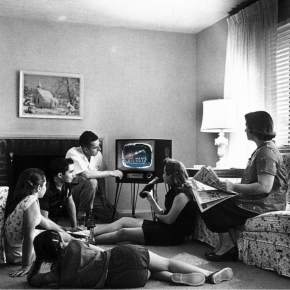 On July 20 1969, the Apollo XI mission orbited the Moon.
On July 20 1969, the Apollo XI mission orbited the Moon.
The Lunar Module Eagle separated from the Command Module Columbia. Aboard Columbia, Michael Collins watched while Neil Armstrong piloted himself and Buzz Aldrin down to the Sea of Tranquility. Corvallis residents watching the landing on television, or listening on the radio, heard Armstrong say – 17 minutes and 40 seconds after 1 p.m. – “Tranquility Base here. The Eagle has landed.” Officially, those were the first words spoken from the Lunar surface.
There’s a case to be made that the actual first words came a few seconds earlier: “Contact light,” meaning that a light on the instrument panel had come on, activated by a sensor in one of the landing legs, confirming that leg had touched the surface. It’s a plain, utilitarian phrase, not as portentous as the official one and perhaps more appropriate to celebrate. Certainly, they were words that the people at Mission Control in Houston were glad to hear.
Several hours later, Armstrong and Aldrin checked the seals on their suits and opened the hatch, watching the Eagle’s thin plexiglass windows lose their bulge as the air escaped. Aldrin observed afterward that this was a reminder of just how flimsy a vessel it was they had entrusted with their lives. Armstrong stepped onto the ladder first and climbed down. He paused before dropping the short final distance and said, “This is one small step for [a] man, one giant leap for mankind.” (People will still be arguing in 2969 whether or not Armstrong said “a,” as he intended.)
If you’re old enough to have watched that event, where were you? How old were you? What do you remember about that day?
Here’s what a few Corvallisites had to say:
Diane Siebracht says she was in Stockton, Calif. at Summer school. “They brought us all into the auditorium to watch it on television. No explanation, so it was confusing at first. We couldn’t really hear it that well. But I was pretty close to the front so I could see it okay.
“I remember the climb out of the capsule. They’d been letting us watch in the classroom but the big event they had us all go to the auditorium. Because it was our pennies that kept the NASA program alive. I remember that also. They had different cans you could drop your pennies in. NASA or the Red Cross.”
Kathe Slayton was in Portland. “[I watched it] on television in my neighbor’s backyard, with my neighbor, with all of our children swarming around us.”
Sylvia Ann “watched it in the library in Corvallis… at Mountain View grade school!”
Fred Towne says, “I was in Davis, California and made a point of washing dishes as they landed.” (I wonder if he thinks of the Moon landing now every time he washes dishes.)
Stephanie Bell-McCormick has a different story to tell: “I was 14 and at Arrowbear Music Camp [in San Bernardino, Calif.]… they set up a TV in the dining hall. Since we didn’t know exactly when it would happen, if we wanted to be woken during the night to watch it, we hung a sock over the end of the bunk. It happened during the day though.”
It happened in the middle of the night for Alice Hazelgrove: “The nuns at my English boarding school got us up in the middle of the night (previously unheard of!) to watch on a tiny black and white TV.”
Colin Ellingson was on his parents’ farm in Tualatin. “I badly wanted to watch it although I had a migraine. I was 7. We turned down the room lights and brightness of the TV so I could watch it. Totally worth it in my opinion.”
Ricardo M. Letelier was “a 7-year-old boy living in Rome at the time, watching the moon landing while wearing pajamas on the family room’s floor.”
Ken Kingsley says he and his wife had been married for almost two months, and were living in Colorado Springs where he was in the Air Force. “We both almost stopped breathing as the crew neared touch down. We were as relieved as Walter Cronkite was when we heard ‘The Eagle has landed.’”
James Agle says, “I was born four years after.” He was born July 20, four years to the day after the landing.
And me? I was eight years old, living in Philomath. I also seem to be suffering from the Mandela Effect. Even though the record shows clearly that the landing took place at 1:17 p.m. in the Pacific time zone, I remember being rolled, bleary-eyed out of bed early in the morning to watch the landing, and was barely able to focus on the historic moment, especially seeing as what the television offered was far from the clear and dramatic footage you see in historical films, but rather animated simulations of what the landing would be like, provided to the TV networks by NASA, and fuzzy radio voices I could rarely understand. I actually missed hearing Armstrong say, “The Eagle has landed,” but I’ll never forget my mother’s excited scream, repeating the words.
by John M. Burt
Do you have a story for The Advocate? Email editor@corvallisadvocate.com

